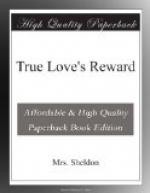“At first she would not believe one word of it—she had the utmost confidence in the man she idolized; but as the days went by and he did not return she began to fear there was some foundation for my statements. Then a few cunning suggestions to the landlord and his wife poisoned their minds against her. They accused her of having been living in their house in an unlawful manner, and drove her out of it with anger and scorn.
“She left on the fifth day after Walter’s accident, and I hired the butler of the house to go with her and make it appear as if she had eloped with him. He carried out my instructions so faithfully that their sudden flitting had every appearance of the flight of a pair of lovers. When Walter received no answer from his wife, and she did not go to him, as he requested, he became very anxious, and insisted upon returning to Paris, in spite of his injury. Immediately upon his arrival he was told that his lady had eloped with the butler of the house, and the angry landlord compelled him to quit the place also.
“I did not set eyes on him again for more than two years, when he returned at Miss Dinsmore’s earnest request, for she had not long to live. He did not seem like the same man, and apparently had no interest in life. When Miss Dinsmore on her death-bed begged him to let her see the consummation of her one desire he listlessly consented, and we were married in her presence, and she died in less than a month. Then he confessed his former marriage to me, and told me that he had a child; that her home must be with us, and to escape all scandal and remark we would go to the far West. I was furious over this revelation, but I concealed the fact from him, for I loved him with all my soul, and I would have adopted a dozen children if by so doing I could have won his heart. I consented to have you in the family, provided that you should be reared as his niece, and never be told of your parentage. He replied, with exceeding bitterness, that he was not anxious that his child should grow up to hate her father for his lack of faith in her mother, and his deep injustice to her.
“We went to San Francisco to live, but I hated you even more bitterly than I had hated your mother, and every caress which I saw my husband lavish upon you was like a poisoned dagger in my heart. But he never knew it—he never knew that I had had anything to do with the tragedy of his life, until more than a year after our marriage.
“My own child—a little girl—was born about ten months after that event; but she did not live, and this only served to make me more bitter against you; for, although my husband professed to feel great sorrow that she could not have lived to be a comfort to us and a companion to you, I knew that he would never have loved her with the peculiar tenderness which he always manifested toward you.




